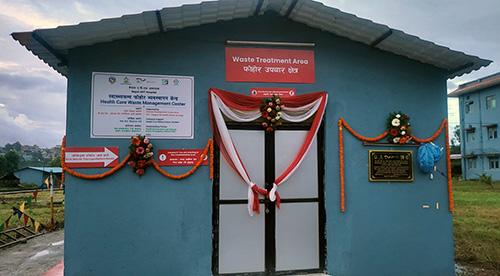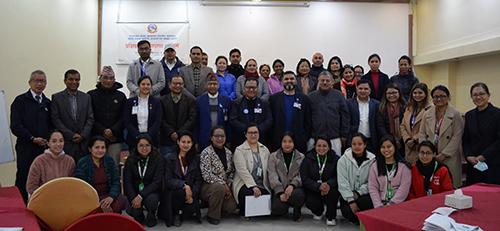In Nepal, hospitals and health centers generate between one and almost two kg of health care waste per bed per day. While 55 to 75% of it is no more hazardous than regular household waste, the remainder is hazardous. Without proper segregation at the source, the entire waste stream must be managed and treated as hazardous waste.
The Nepali Ministry of Health and Population has initiated a health care waste management project in collaboration with the German Development Cooperation through GIZ (Deutsche Gesellschaft für Internationale Zusammenarbeit). Health Care Without Harm and HECAF360 provide the technical support for this project, which is underway in four hospitals in Kathmandu. The goal is to help institutions achieve sustainable health care waste management and to become environmentally resilient.
New waste treatment area, Nepal Armed Police Force Hospital. Photo: HECAF360
As part of this initiative, hospitals and their staff have received access to tools, training, and additional resources needed to allow them to better monitor, track, and sort waste and to comply with Nepal’s health care waste management standards.
“The commitment of hospitals participating in the project has really stood out and serves as a driving force to move this important work forward,” explains Neydi Cruz, Health Care Without Harm’s Sustainability associate director.
Hospital staff participated in a six-day training program on Environmental Health, Healthcare Waste Management and Water, Sanitation and Hygiene, endorsed by the National Health Training Center, and Management Division/Department of Health and Services of Nepal.
Subsequently, participants trained colleagues within their facilities and participated in virtual sessions on the use of Health Care Without Harm’s waste trackers, six spreadsheet-based tools designed to help facilities track and record how health care waste is produced and managed.
Participants of the trainer of trainers session. Photo: HECAF360.
HECAF360 set up model ward-level waste segregation systems, which the hospitals replicated at their own pace. “The aim is for us to support each facility to take ownership of their waste management systems so that they develop the capacity to run them independently,” says Ruth Stringer, Health Care Without Harm’s Science and Policy Coordinator.
Two of the four hospitals from Kathmandu participating in the project joined the Global Green and Healthy Hospitals network. They and other member hospitals will also participate in a sharing and learning workshop in Kathmandu in the coming months.

